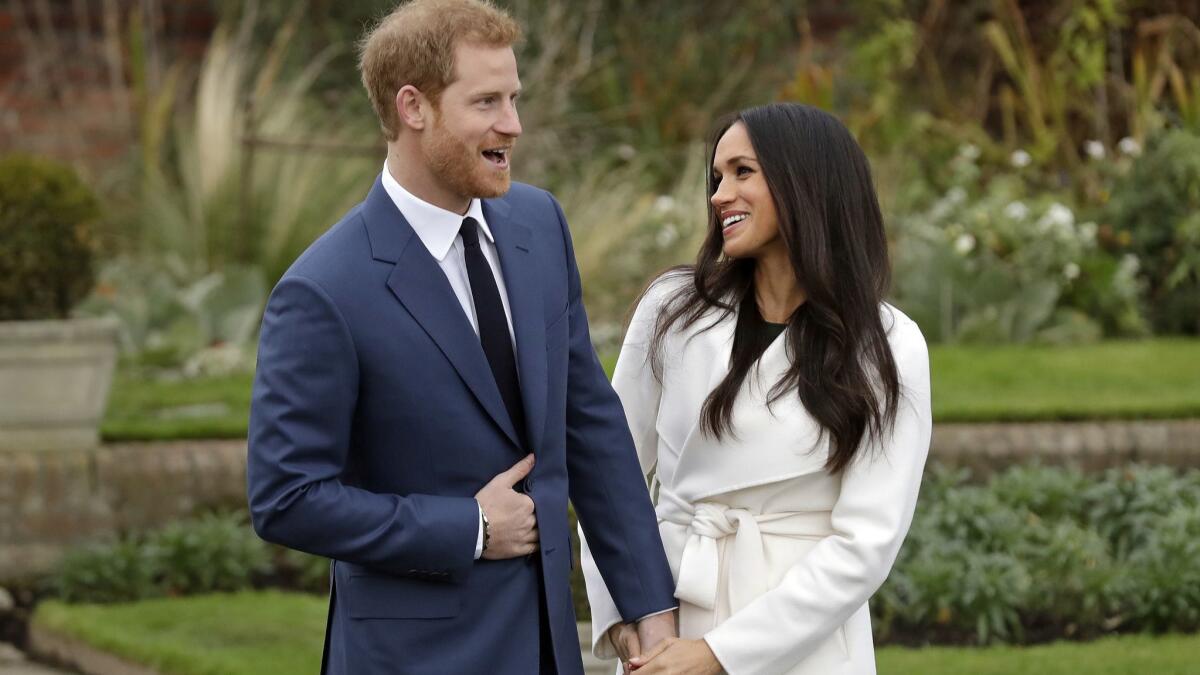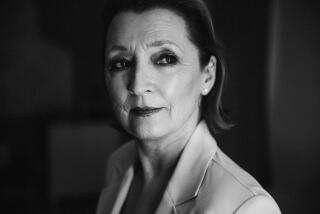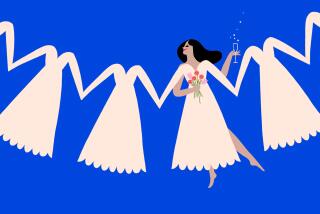Op-Ed: A royal wedding that reboots the fairy tale that anyone can be a princess — and this time we mean it

In the two minutes it will take Meghan Markle to walk down the aisle of St. George’s Chapel on Saturday to marry Britain’s Prince Harry, the totems of tradition that have marked British royal marriages for decades, if not centuries, will topple once and for all.
Markle is a commoner — more shocking, an American. She’s black, she’s divorced and, at 36, she’s the older woman. (Harry is 33.) And she’s an actress; Markle just logged her final season on the TV legal drama “Suits.” A few monarchs ago, “actress” would have been one rung above strumpet.
From all appearances, none of this matters to Queen Elizabeth II, Prince Charles or any of the other members of the royal family. Less than a century ago, King Edward VIII felt compelled to abdicate his throne to marry an American divorcee (Wallis Simpson). As recently as the ’80s, Charles, supposedly, felt pressured into marriage with the proper, unblemished Diana — a miserable mismatch.
Of course, the queen has dispensed with some of these disastrous conventions since Diana’s death. Charles married Camilla. William married a commoner, Kate Middleton.
Now, Markle offers a stunning reboot of the fairy tale: “Anyone can grow up to be a princess — and, this time, we mean it.”
Markle’s would-have-been mother-in-law, Diana, was crowned the people’s princess because she connected with those on the rope lines and cradled children whose limbs were blown off by landmines. But she grew up Lady Diana Spencer, the daughter of an earl, living in a house on a royal estate. Markle’s only youthful brush with a palace was posing in front of Buckingham as a tourist.
The mere fact that Markle is biracial and an American puts an ocean of difference between her and every British royal bride who has come before her.
Not that Markle is Cinderella. She graduated from Immaculate Heart High School in Los Angeles and Northwestern University. Her African American mother, Doria Ragland, is a social worker and has a home in View Park. Her white father, Thomas Markle, was director of photography on the TV show “Married With Children.” (Her parents are long divorced.) Markle ran with a tony crowd in Toronto, where “Suits” is filmed, and traveled frequently, including to London, where a British socialite friend arranged for her to meet Harry.
But the mere fact that Markle is biracial and an American puts an ocean of difference between her and every British royal bride who has come before her. At a time when black men get arrested for sitting in Starbucks and someone calls the cops on a black student napping in a Yale common room, race is hardly a nonissue.
Countdown to the Royal Wedding: Your complete guide to the royal wedding 2018 »
The royal family may be post-racial (or think they are), but the rest of Britain is not. London is a polyglot, global city, but Britain, overall, is 87% white and just over 3% black. The “Brexit” vote was fueled partly by anti-immigrant fervor. Under tough new immigration laws, some of the thousands of Caribbean immigrants who have lived and worked legally in England for decades have been wrongly threatened with deportation.
Against that backdrop, Markle has stoked curiosity. Her new fans — young, old and of varying ethnic groups — crowd events, hoping to make contact. Little black girls beam when they see her. One, Sophia Richards, 10, confided that she wanted to be an actress too. “Meghan told me that I can achieve whatever I want to achieve,” the girl told People magazine. “I will never forget this day.”
Commerce says Markle’s a hit too. There are websites chronicling everything she wears (whatmeghanwore.net and meghansfashion.com are just two) and where you can buy it — if you can get there before it sells out. One consulting firm says the Harry-Meghan wedding could add $1.4 billion to the British economy. All the big broadcast networks — plus PBS, E! and BBC America — will cover it live. Only 600 guests — intimate by royal wedding standards — are invited to the ceremony. But 2,600 members of the public (hand-chosen) will be allowed to, well, watch outside the chapel on the grounds of Windsor Castle in Windsor.
Obviously, some naysayers denounce the monarchy, especially royal weddings, as nonsense. They are expensive. Although the queen and Prince Charles will pick up most of the tab for Saturday’s celebrations, taxpayers will contribute $42 million for security. But consider that 100,000 people are expected in Windsor. That’s not the day to skimp on security.
Here’s a possible downside to the pageantry: Some little girls who tune in may internalize the message that marriage supersedes all other ambitions. Consider everything that Markle is giving up — her career, her country (although she reportedly will have dual citizenship), her Instagram account. That’s as old-fashioned as Grace Kelly leaving behind her life and career to marry Prince Rainier of Monaco in 1956.
After Markle opens her 185th community center, she may long for the independence she once had. Then, again, with Harry sixth in line to the throne and out of reasonable contention for the crown, maybe the two of them can chart an unconventional course — live in Africa? start a theater? If they keep surprising Britain the way they’ve already done, that would be a fairy tale ending.
Carla Hall is an editorial writer for The Times.
Follow the Opinion section on Twitter @latimesopinionand Facebook
More to Read
A cure for the common opinion
Get thought-provoking perspectives with our weekly newsletter.
You may occasionally receive promotional content from the Los Angeles Times.











